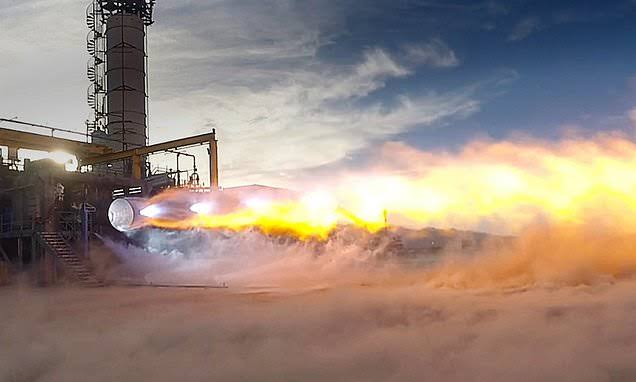Billionaire Amazon founder Jeff Bezos quietly lost one of his private space company Blue Origin’s BE-4 rocket engines last month — when the $7 million staged-combustion device erupted into a fireball during a routine test.
The accident comes just less than a year after Blue Origin’s New Shepard rocket failed in mid-air, one-minute after liftoff, due to an ‘anomaly’ last September.

The BE-4, which had been scheduled to ship to Blue Origin’s client in July, exploded approximately 10 seconds into the test.
The explosion was so catastrophic, according to leakers who reviewed a video of the June 30 accident, that it also severely damaged the test stand infrastructure surrounding the rocket engine at the company’s West Texas facility.

A spokesperson for Blue Origin released a statement Tuesday confirming rumors of the incident, but added that ‘No personnel were injured.’
‘We are currently assessing root cause,’ Blue Origin told cable news financial network CNBC in a prepared statement.
‘We already have proximate cause and are working on remedial actions.’
Word of the incident came from multiple leakers familiar with operations at Blue Origin’s West Texas facility where the explosion occurred.
The leakers spoke to CNBC anonymously so that they could ‘discuss nonpublic matters.’
Although the accident had not been made public in June, Blue Origin says that it notified its client, United Launch Alliance (ULA), ‘immediately.’
ULA, a joint venture between military contractor Lockheed Martin and Boeing, had expected to receive the BE-4 when it completed testing this July for use in the company’s second Vulcan rocket launch.
The joint-venture has been the primary competitor to Tesla and Twitter billionaire Elon Musk’s SpaceX, facing off in bids for lucrative US military launch contracts.
Prior to the incident, ULA’s first Vulcan launch had already been rescheduled to the fourth quarter of this year.
Last month, ULA had passed a crucial milestone in the preparation of their first Vulcan launch, called Cert-1, a short static test firing of their rocket using two BE-4 rocket engines.
‘The BE-4 testing issue is not expected to impact our plans for the Vulcan Cert-1 mission,’ a ULA spokesperson told reporters this week.
The company said that the BE-4 engines that Blue Origin has already delivered for Cert-1 ‘successfully passed acceptance testing’ and are up to snuff for launch.
For it’s part, Blue Origin’s spokesperson noted that the company built two stands for its BE-4 tests and will be able to ‘continue testing’ in West Texas despite the damage to one platform.






